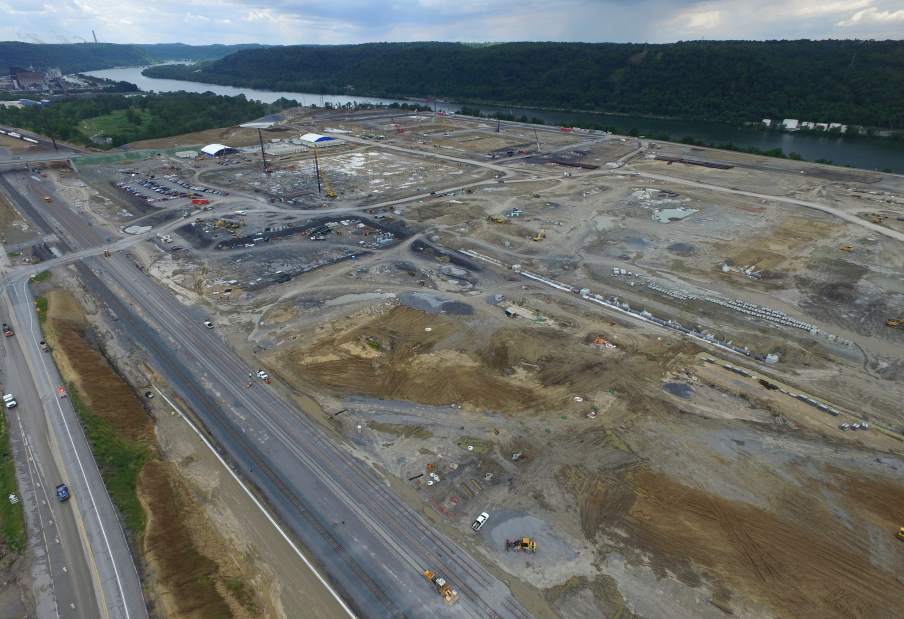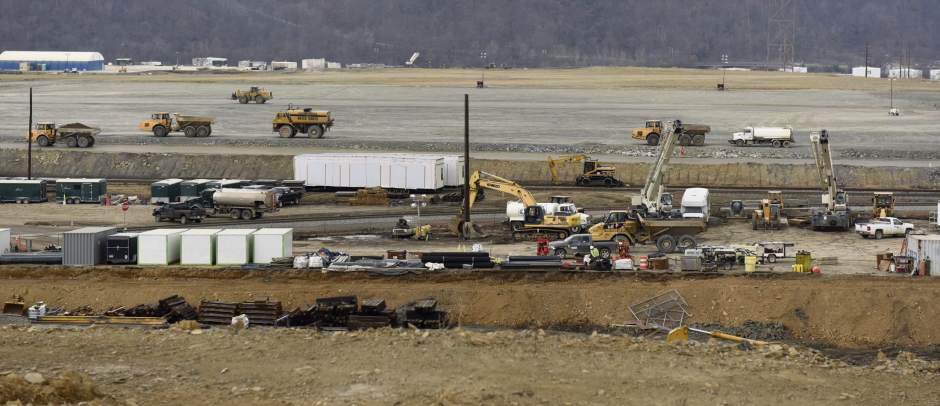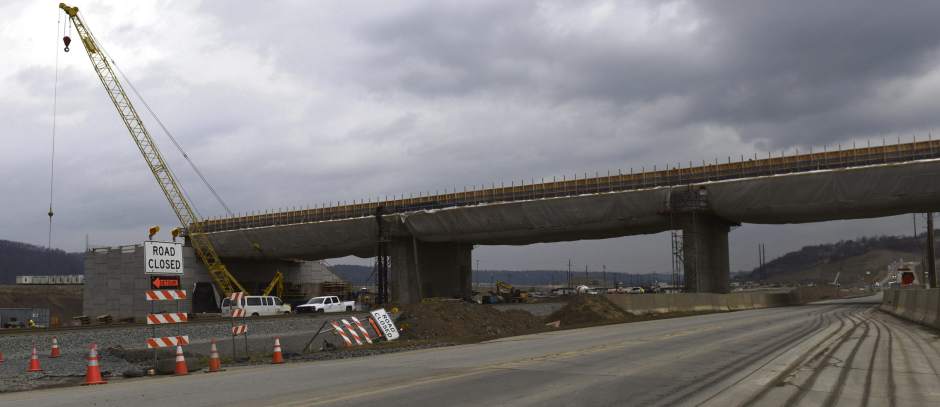Shell moves ahead with ethane cracker in Beaver County
Royal Dutch Shell's decision to go ahead with its multibillion-dollar petrochemical plant in Beaver County shifts the discussion over reaping benefits of the shale gas boom from whether it will spur manufacturing to how much.
Civic and business leaders said Tuesday's long-anticipated announcement by the energy giant — more than four years after it picked a site at a shuttered zinc smelter along the Ohio River — signals good news: for shale drillers challenged by low prices, for a manufacturing base left low by steel's demise, and for 6,000 workers Shell will employ during construction.
“The term game-changer is much overused, and I'm guilty of over-using it. But it absolutely is appropriate in this case,” Gov. Tom Wolf told the Tribune-Review hours after Shell made the announcement with little fanfare. “This is a game-changer for our economy.”
The so-called final investment decision sets up another four or five years of work; Shell said construction will begin within 18 months and wrap up “early in the next decade” on the first major ethane cracker to be built outside the Gulf Coast in 20 years. It eventually will employ 600 people.
The company cited as reasons for its decision the site's proximity both to plentiful ethane produced by many Marcellus shale gas wells here and to potential customers for the ethylene it will produce — a building block of plastics. It also stands to receive a tax credit package worth tens of millions annually.
“More than 70 percent of North American polyethylene customers are within a 700-mile radius of Pittsburgh,” the company said in a news release.
The announcement appears to end years of debate that swirled as Shell prepared the massive site in Potter and Center while a global collapse in oil and natural gas prices prompted the company to lay off thousands and halt other projects. Increased work on the site — which included construction of a bridge over nearby Route 18, movements of power lines and $80 million in environmental remediation — escalated speculation even as Shell cut costs worldwide.
“The fact that Royal Dutch Shell is still moving forward on this tremendous investment at a time of historic low oil and gas prices is a testament to our commonwealth's commitment to developing our abundant natural resources,” said Sen. Camera Bartolotta, a Republican whose district includes southern Beaver County.
CEO Ben van Beurden said the company, which recently acquired gas producer BG Group, would reduce capital spending this year to $29 billion, 35 percent lower than the two companies spent in 2014. Shell has not put a price tag on the Beaver County project, though analysts estimate it at between $6 billion and $7 billion.
Shell's delay in starting construction prompted questions from at least one analyst who said an 18-month pause is unusual.
“I guess I'm not 100 percent convinced,” said Steve Lewandowski, global business director for olefins at Houston-based energy analyst IHS. He said Shell still needs to watch its cash flow as oil remains around $50 per barrel.
The delay might provide time for workers to finish plants on the Gulf Coast over the next few years before shifting to Beaver County, Lewandowski said. The Allegheny Conference on Community Development said the region will need to pull from other states to fill the construction jobs needed to build the plant.
Shell spokesman Ray Fisher said the company has canceled projects it began, though he could not say whether that was after final investment decisions were announced.
Wolf and others said they have no doubt Shell is moving ahead on Western Pennsylvania's largest building project in a generation.
“We believe that a capital investment of this magnitude indicates to other companies in the energy, petrochemical and plastics industries that southwestern Pennsylvania should be on their short list of locations for new facilities and expansions,” said Allegheny Conference CEO Dennis Yablonsky. He noted that polyethylene demand is forecast to grow worldwide.
Environmental groups fought the state air permits Shell received in 2015 and complained about the wide swath of land cleared on both sides of Route 18 after the company bought the former Horsehead Holdings Corp. zinc smelter and neighboring properties for $13.5 million.
“We continue to have concerns about the significant air pollution being added to our region, just as we are starting to make progress cleaning up our air,” said Myron Arnowitt, Pennsylvania director for Clean Water Action.
Advocates say the plant will bring more benefits as plastics manufacturers set up shop close to the cracker.
“Those products will span from food to fabrics to outdoor decks. All those things can now be made here, in the middle of the market, the Keystone State,” Wolf said, noting the company he used to own had to source its PVC for decks and railings from Texas.
That will provide relief for gas drillers who will get a large local customer for 90,000 barrels of their ethane daily. Limited pipelines to more lucrative markets have pushed down prices, prompting layoffs and a huge slowdown in drilling.
Cecil-based Consol Energy, one of the companies that contracted with Shell to sell it ethane, said the announcement “marks a major turning point for the region.”
“This investment ... reflects that fact that domestic manufacturing's potential is near limitless thanks to our abundant and stable energy supplies from natural gas,” said David Spigelmyer, president of the North Fayette-based Marcellus Shale Coalition.
The Shell plant is one of three proposed for the region. Brazilian energy companies Braskem and Odebrecht put on hold a plan to build in West Virginia, but Thai firm PTT Global Chemical continues to assess a possible site in Belmont County, Ohio.
Belmont County Commissioner Mark Thomas said he does not think Shell's decision will deter PTT.
“In my mind it validates that southwestern Pennsylvania and eastern Ohio ... have sufficient resources to handle multiple cracker plants, at least two,” he said.
Potential contractors also expect to see benefits.
Steamfitters Local 449 in Pittsburgh has been ramping up its apprenticeship program in anticipation of Shell's announcement, union business manager Ken Broadbent said.
“I brought in 70 percent more apprentices than usual,” Broadbent said. “I'm trying to be proactive and get ready for a big project like this.”
Downtown-based specialty steel producer Allegheny Technologies Inc. said the cracker project could benefit the company's Flat Rolled Products business, which makes stainless steel and titanium alloys for pipes used in the energy industry. ATI laid off about a third of the nonunion workers from the Flat Rolled Products business in April in response to the downturn. The layoffs followed the indefinite idling of mills in Midland and Gilpin where more than 600 workers were employed.
Staff writers Alex Nixon and Brad Bumsted contributed to this report. David Conti is the assistant business editor at the Tribune-Review. Reach him at 412-388-5802 or dconti@tribweb.com.








